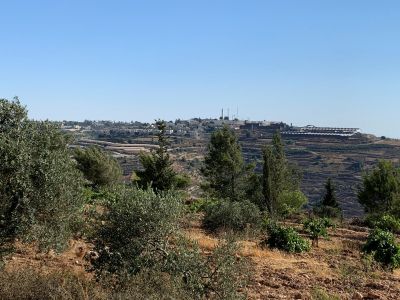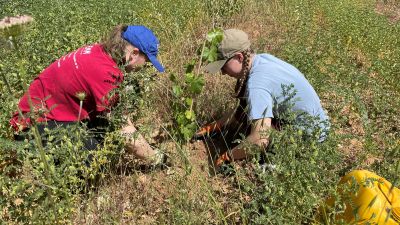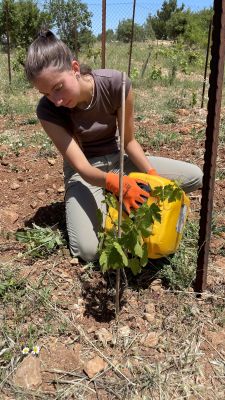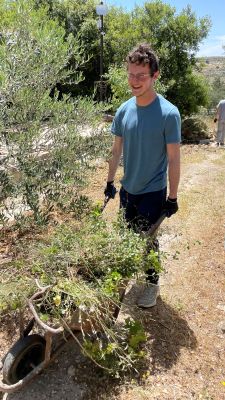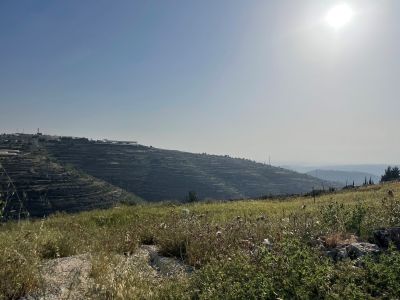“The Land is Not Empty”
Ruby Meyer
Moving methodically down rows of young grape vines, olive trees, and almond trees, our class worked together to water the plants in each row. We dug around each one, poured in a small amount of water, then replaced the soil and topped it with bunches of dried grass to hold in the moisture. I was already familiar with this mulching technique from the dry summer months in our garden back home, but there was a reason behind it I had not dealt with before – lack of access to running water.
The plants receiving our care were located on a Palestinian farm called Tent of Nations. Israeli government restrictions as well as settlements in the area mean that Tent of Nations is not in charge of their own borders, water, or electricity, and their access to outside resources is severely reduced. The water available for us to hydrate the young trees and vines was limited to rain water that had been collected throughout the year, while bordering Israeli settlements have swimming pools replenished by a constant water supply.
The Tent of Nations farm has been owned by the same Palestinian family for over 100 years. The family bought and registered the land under the Ottoman Empire, which had control of the area before Israel claimed power in 1948. The shift to Israeli control is known by Palestinians as the Nakba, or catastrophe, due to the widespread depopulation and destruction that began in 1948 and has continued until now. Today, Palestine has control over only 22% of its original land, a shrinking fraction that remains under constant threat.
Since the Nakba, the Nassar family has worked diligently against the Israeli government to maintain ownership of their land. Over the last 32 years, repeated legal battles have ensued where the Nassar family must counter Israeli claims to the land through ownership documentation, witness accounts, and accurate maps of the location. Legal battles are not the only struggle – the family has also been physically threatened by Israeli settlers, both through individual altercations and destruction of their cropland.
There are several reactions we might expect from those who are faced with this kind of violence and injustice. Many people would resort to retaliative violence, others would leave for lives elsewhere, and others would remain but give up hope for meaningful change. Each of these is an understandable human response, and all are options that have been followed by Palestinians as they continue to face the Nakba. The Nassar family, however, embraces a different response with which many Palestinians also resonate. Adhering to the slogan, “We refuse to be enemies,” the Nassars are committed to working towards justice in an active but nonviolent way through the stewardship of their land. They assert strongly that their problem has never been with the Jewish or Israeli people, but with the policy of the government, and they strive to inform others through open conversation.
Through my interactions with Daoud, Amal, and Daher Nassar, as well as other Palestinians, it seems that such a deep commitment to nonviolent action in support of Palestine is possible due to an incredibly close connection with the land. In a discussion with our group, Daoud explained that the land is intimately tied into the Palestinian identity and expressed his family’s values of sustainability that allow them to care for the land and survive the treatment they receive from the Israeli government. During our three day visit to their farm, we saw solar panels, composting toilets, frugal use of water, and intercropping of drought-tolerant trees. Each of these techniques serves a dual purpose of sustainably caring for the land while allowing the family to continue living there amidst the Israeli occupation.
Another Palestinian speaker, Jack Munayer, outlined similar understandings of how Palestinians relate to the land, such as how they view their connection to it as self-evident. They see themselves as custodians or caretakers of the religious sites and natural spaces, undeniably meant to be there to fulfill such duties. Unfortunately, the self-evident nature of this connection is not so evident to Israelis nor the international community. The Israeli government sells a narrative of “empty land” which is available and meant to be home to a Jewish state, not a land lived with and loved by Palestinians. Many people within Israel and beyond are ignorant of the Palestinian story as it is so often left out and ignored.
As my understanding of the Palestinian story grew over the course of our trip, I began to see many parallels with the narrative of land in North America. Israel and the United States share colonialist values that embrace their right as the ruling power to occupy the land. Palestinians are experiencing many of the same things that North American indigenous groups have experienced and continue to face due to settlement and exploitation. The excision of their history from the history that is told is one of the most powerful of these shared experiences and allows injustices to continue against Palestinians and indigenous groups in the Americas.
Being aware of the multiple histories that exist and working to combine them is an important part of justice work, both in North America and in Palestine. Serving at Tent of Nations and getting my hands in the soil allowed me to experience the Palestinian story of the land in a way I would have missed out on otherwise. It seems that opportunities to engage with the earth itself allow us to better understand its people, especially when place and people are tied together in conflict the way they are in the Holy Land. Today, Palestinians are being denied access to the land they have always been connected to, and Israelis are building their own meaningful connections to the places Palestinians once inhabited. The land that ties Palestinians, Israelis, Jews, Muslims, and Christians together is being used to divide them apart, sectioned off by walls and roadblocks and military. Amidst this reality, the land can also be a tool for reconciliation and nonviolent resistance, as demonstrated by the Nassar family. The land is not empty, but filled with a people devoted to stewarding it and its history.





